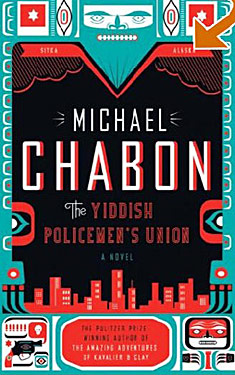Michael Chabon
Read early 2013, reviewed 6/1/2013
2 stars
What a tedious book!
I had not read Chabon before this.
But I was aware that he was quite a critical darling, and had won a
Pulitzer. I had high expectations for the
book, and was utterly disappointed. After
reading, I came to the conclusion that the only reason this book won the Hugo
was because fans thought they needed to jump on the Chabon bandwagon, that they
wanted to have at least one Hugo winner also be a famous literary prize winner.
 This is another noir genre book. The basic premise is really interesting.
This is another noir genre book. The basic premise is really interesting.
What kills this book is the prose. The prose is so overwrought, at the end of
every paragraph, all I could imagine was Chabon at his computer, looking at the
paragraph and saying to himself, “Wow, I’m such a good writer!” or “I bet you never saw anybody ever
described a scene like this before, eh, eh?”
Here’s my perception of Chabon’s formula for each
paragraph. A character begins a
statement. This is followed by some
crazy non-sequitor prose. The character
finishes the statement. It made all the dialogue in the book very difficult to
follow. And the prose added nothing to
the statement. It only takes a few pages
to get the mood and setting of the book.
But Chabon pounds this over your head with every paragraph he writes.
There was a lot of potential in the book, the universe, the
characters, the plot. But I felt
derailed by the prose every step of the way.
I just couldn’t get interest in anything because I wasn’t allowed to sit
with anything without being interrupted by the prose.
I created a Chabon-homage paragraph which I am quite proud
of:
He nods his head and smiles, with teeth like peppermint
chicklets chewed in twos, threes, or whole packs by young children trying to
blow bubbles as if it were a piece of bazooka, gum which only could be obtained
from boutique candy stores in quaint old-fashioned purveyors of discontinued
candies, in mountain towns now dwarfed by casinos converted from renovated
antique stores, which gamblers only visit to reminisce over long forgotten
brandless penny candies, when leaving one parlour of despair believing the next
parlour would be one of hope, and says, "My ex-wife," with sadness
entering his grey cloudy eyes as he remembers their days of sex, constant and
daily, in any room, at any time, on the stove, on the kitchen table, in the
bathroom, in the closet, in the park among the forsythia bushes, in the bus
station toilet, even on that couch in the station, "left town."
Two stars, because of the concept. And I liked the main character and the murder
victim. No other reason.
No comments:
Post a Comment